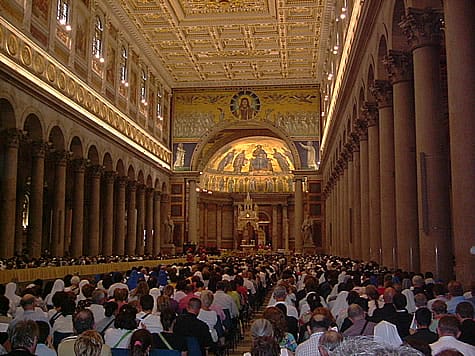On Saturday, 28 June, the year dedicated to Saint Paul was opened with the celebration of the first vespers of the solemnity of the holy apostles Peter and Paul. The liturgical act, at which Pope Benedict XVI presided, was participated in by the Ecumenical Patriarch of Constantinople, Bartholomew I, as well as by the different representatives from other Christian churches. Before the statue of Saint Paul at the entrance of the basilica a candle was lighted that will burn during the whole Year of Saint Paul inviting all Christians to listen to the Apostle. The celebration took place with a distinctive and profound ecumenical sense.
Love and freedom
Benedict XVI recalled how Paul’s experience of being deeply loved by Christ opened his eyes to the truth and the way of human existence. That experience embraced it all. Henceforth, Paul would speak and act moved by the responsibility of love. This freedom and this responsibility are intimately united. The Pope once more underscored the experience of Saint Augustine by recalling that this same spirit of liberty and responsibility in love was what impelled the saint of Hippo to coin one of his most famous and quoted phrases: “Love and do what you will”. The expression is found in the “Treatise on the First Letter of Saint John”, specifically in Chapter 7, numbers 7 and 8.
Year of vocations


Paul’s letters are a reference for living the faith, progressing in the journey of vocation and seeking the will of God. Paul’s letters are a reference for living the faith, progressing in the journey of vocation and seeking the will of God. They had a special importance in the conversion and vocational discernment of Saint Augustine. The Bishop of Hippo remembers it thus in his Confessions: “Most eagerly, then, did I seize that venerable writing of Your Spirit, but more especally the Apostle Paul; and those difficulties vanished away, in which he at one time appeared to me to contradict himself, and the text of his discourse not to agree with the testimonies of the Law and the Prophets. And the face of that pure speech appeared to me one and the same; and I learned to “rejoice with trembling” (VII, 21, 27). Later, in the garden in Milan, when his inner struggle exploded, the words of Paul (Romans 13,13) made him feel as if a light of certainty shone on his heart, banishing all darkness of doubt (Confessions VII, 12, 29).
Year of Saint Paul
Benedict XVI announced a year ago the celebration of the two thousandth anniversary of the birth of Saint Paul, which historians place between 7 and 10 A.D. The Pope said then that between the 28th of June 2008 and the 29th of June 2009, “a series of liturgical celebrations, cultural and ecumenical events, as well as various pastoral and social initiatives, all of them inspired in the Pauline spirituality” would be organized. Benedict XVI said that “study congresses and special publications on Pauline texts would be promoted to make increasingly known the immense wealth that they contain, a genuine patrimony of the humanity redeemed by Christ”. Special attention to the ecumenical dimension would be given in organizing the celebration of the different events of the Pauline bimillenary.


